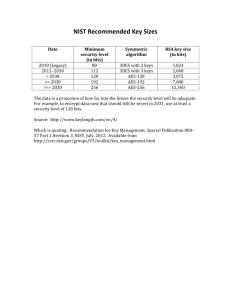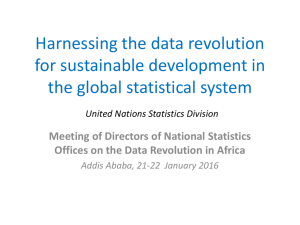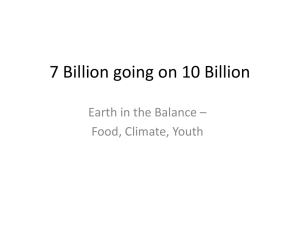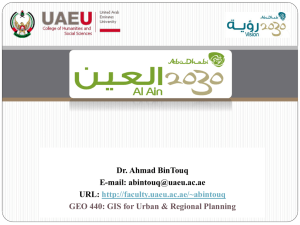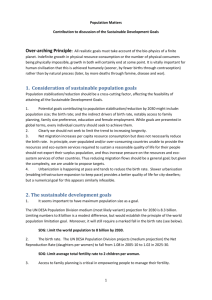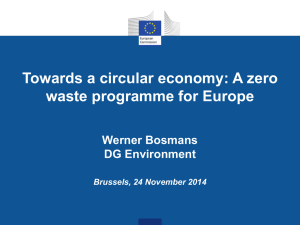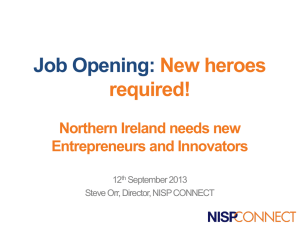Agenda of the National Consultation on the SDGs, February 9
advertisement
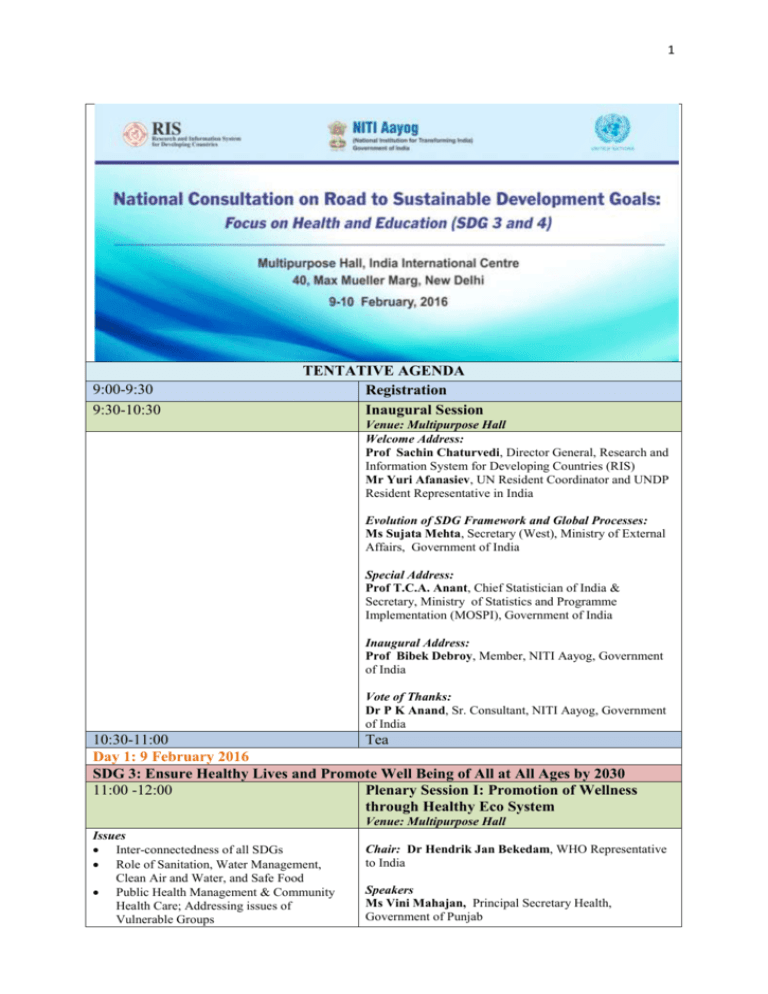
1 9:00-9:30 9:30-10:30 TENTATIVE AGENDA Registration Inaugural Session Venue: Multipurpose Hall Welcome Address: Prof Sachin Chaturvedi, Director General, Research and Information System for Developing Countries (RIS) Mr Yuri Afanasiev, UN Resident Coordinator and UNDP Resident Representative in India Evolution of SDG Framework and Global Processes: Ms Sujata Mehta, Secretary (West), Ministry of External Affairs, Government of India Special Address: Prof T.C.A. Anant, Chief Statistician of India & Secretary, Ministry of Statistics and Programme Implementation (MOSPI), Government of India Inaugural Address: Prof Bibek Debroy, Member, NITI Aayog, Government of India Vote of Thanks: Dr P K Anand, Sr. Consultant, NITI Aayog, Government of India 10:30-11:00 Tea Day 1: 9 February 2016 SDG 3: Ensure Healthy Lives and Promote Well Being of All at All Ages by 2030 11:00 -12:00 Plenary Session I: Promotion of Wellness through Healthy Eco System Venue: Multipurpose Hall Issues Inter-connectedness of all SDGs Role of Sanitation, Water Management, Clean Air and Water, and Safe Food Public Health Management & Community Health Care; Addressing issues of Vulnerable Groups Chair: Dr Hendrik Jan Bekedam, WHO Representative to India Speakers Ms Vini Mahajan, Principal Secretary Health, Government of Punjab 2 Anticipation of Pandemic Outbreaks and Disaster Management Availability of modern energy and transport Strategies for life-style diseases alleviation – WELLNESS (peaceful mind & healthy body) Role of Education: Health Education in Schools Tackling alcoholism, smoking, drug abuse, mental health issues Role of public advocacy and media Dr K. Ellangovan, Secretary, Department of Health & Family Welfare, Government of Kerala Dr Ashok Kumar Jain, Adviser (RD), NITI Aayog Dr Sanjiv Kumar, Executive Director, National Health Systems Resource Center (NHSRC) Discussant Dr Sanjay Pandey, Director-Programs, Population Foundation of India Targets (2.1, 2.2, 3.5, 3.6, 3.9, 3.a, 3.d, 6.1, 6.2, 6.3, 7.1, 11.2) 12:00 -13:00 Plenary Session II: Targets and Indicators Venue: Multipurpose Hall Issues Global Monitoring Framework and Principles for Development of National Indicators Monitoring SDGs and Identification of Periodic Targets Standardization, Harmonization and Periodicity Issues Coordination among different Ministries/Departments Data Collection and New Approaches UN SDG Declaration Para 57: …. increased support for strengthening data collection and capacity-building…….. Chair: Dr P K Anand, Sr. Consultant, NITI Aayog Speakers Dr Krishna Kumar, Deputy Director General (SSD), MOSPI Dr Savita Sharma, Advisor (PPD/PE) NITI Aayog Mr P.C.Cyriac, Deputy Director Gen (Stats), Ministry of Health & Family Welfare, Government of India Director (Health), Government of Maharastra Discussant Mr Bhargav Krishna, Public Health Foundation of India Target (17.19) 13:00-14:00 14:00-15:30 Lunch Break Plenary Session III: Health Care Delivery, Infrastructure and Medical Expenditure Venue: Multipurpose Hall Issues Access to affordable medicines, hospitals, pathological labs Access to finance for patients, Health Insurance Human Resource Gaps Targets (3.8, 3.c) Chair: Shri Alok Kumar, Adviser (Health/WCD). NITI Aayog Speakers Dr Akun Sabharwal, Director, Drugs Control Administration, Government of Telangana Dr Mira Shiva, All India Drug Action Network Dr Phyllida Travis, Director Health Systems- SEARO, WHO Ms Leena Menghaney, Head- South Asia, Medecins Sans Frontiers(MSF) Discussant Dr Jaya, National Program Officer , UNFPA 15:30-16:00 Tea/Coffee Break 3 16:00-17:00 Parallel Sessions Parallel Session I: Reduction Parallel Session II: Role of of Mortality Rates and Drug Development and Disease Control Generic Medicines in SDG 3 Parallel Session III: Role of Indian Systems of Medicine (ISMs) in SDG 3 Venue: Multipurpose Hall Venue: Seminar Hall II Issues Primary health care & infrastructure demand CDs and NCDs Post-delivery support and care Issues Availability and patient choice of medicines R&D in vaccines and medicines and Medical Devices Clinical Trials – risk coefficients Venue: Conference Room –I, IIC Main Building Issues Integrating ISMs with public health care system Research and education in ISMs Targets (3.1, 3.2, 3.3, 3.4, 3.7, 5.6) Targets ( 3.8, 3.b) Chair: Prof N.K. Ganguly, Visiting Professor of Eminence, Translational Health Science & Technology Institute and Former Director General, Indian Council for Medical Research (ICMR) Chair: Dr Neena Valecha, Scientist-G & Director, National Institute of Malaria Research (ICMR) Speakers Shri Manoj Jhalani, Joint Secretary, Department of Health &Family Welfare Dr Anjali Nayyar Senior Vice President, Global Health Strategies India Dr Anant Bhan, Researcher, Global Health and Bioethics Speakers Mr Zakir Thomas, IRS, former Director, OSDD, CSIR (Drug Development) Ms Bhawna Sharma, Consultant, ACCESS Mr K M Gopakumar, Legal Advisor and Senior Researcher, Third World Network Discussant Dr Maneesh Singhal, Additional Professor, AIIMS Dr Reji K. Joseph, Associate Professor, Institute of Studies in Industrial Development, New Delhi Chair: Shri Jitendra Sharma, IFS, Joint Secretary, Ministry of AYUSH Speakers Prof Bhushan Patwardhan, Interdisciplinary School of Health Sciences, Savitribai Phule Pune University, Pune Dr M. Beena, Secretary, Department of AYUSH, Government of Kerala Dr P M Unnikrishnan, Research Coordinator, UN-IAS, Tokyo Dr Rajasekharan, Senior Project Consultant, State Medicinal Plants Board, Kerala Discussant Vaidya Vinod Kumar, T.G., Scientist, JNTBGRI Palode, Thiruvananthapuram 4 Day 2: 10 February 2016 SDG Goal 4: Ensure inclusive and equitable quality education and promote lifelong learning opportunities for all 9:30-10:00 10:00-12:30 Tea Plenary Session I: Quality, Access, Equity and Inter-Sectoral Linkages Venue: Multipurpose Hall Issues Learning Outcomes and Quality of Teaching Childhood Development and Preprimary Education Access and Equity at all levels Inclusiveness and Gender Issues Sustainable Development and Health Values Targets ( 4.1, 4.2, 4.3, 4.5, 4.6, 4.7, 4.a, 3.7, 3.a, 5.2, 5.3, 5.6, 8.6, 10.2, 12.8, 13.3) Chair: Prof Ramesh Chand, Member, NITI Aayog Speakers Ms Rina Ray, Additional Secretary, School Education, MHRD, Dept of School Education and Literacy Prof Jandhyala B G Tilak, Vice Chancellor, National University of Educational Planning and Administration (NUEPA) Mr Louis-Georges Arsenault, UNICEF Representative for India Prof Anuradha Chenoy, Dean School of International Studies, Jawaharlal Nehru University, New Delhi Ms Alka Tiwari, Adviser (FR/Admn/(SP-Bihar, Jharkhand), NITI Aayog Mr Ajay Singh Mehta, President, Seva Mandir, Udaipur Discussant Dr Rinku Murgai, Senior Economist, World Bank Ms Mathangi Subramanian, UNESCO, Mahatma Gandhi Institute of Education for Peace and Sustainable Development (MGIEP) 12:30-13:30 13:30-15:00 Lunch Plenary Session II: Education and Skill Development Programmes – Sharing of Experiences Venue: Multipurpose Hall Issues Access and Equity of education for all at affordable and quality training Skill development for better employment and entrepreneurship Targets ( 4.3, 4.4, 4.5) Chair: Mr Amitabh Behar, Executive Director, National Foundation for India Speakers Ms Sunita Sanghi, Adviser, NITI Aayog Shri Rajesh Agrawal, Joint Secretary & CVO, Ministry of Skill Development and Entrepreneurship Mr. Shigeru Aoyagi, Director and UNESCO Representative to Bhutan, India, Maldives and Sri Lanka Mr Abhimanyu Singh, Educationist, Jaipur Dr Uma Tuli, Founder and Managing Secretary, Amar Jyoti Research & Rehabilitation Centre Dr Saroj Bala Yadav, Dean Academic,NCERT Discussant Shri Asadullah, Chief Consultant, TSG, Ministry of Human Resource Development 5 15:00-17:00 Plenary Session III: Global and National Indicators for Quality and Equity Venue: Multipurpose Hall Issues Global Monitoring Framework and Principles for Development of National Indicators Measuring Quality and Equity Standardization, Harmonization and Periodicity Issues Data Collection and New Approaches UN SDG Declaration Para 57: …. increased support for strengthening data collection and capacity-building…….. Target (17.19) 17:00-17:30 17:30:18:00 Chair: Dr Krishna Kumar, Deputy Director General, Ministry of Statistics and Programme Implementation Speakers Mr Arun Mehta, Unified District Information System for Education (DISE) Shri James Mathew, Director, Ministry of Statistics and Programme Implementation Prof K. Ramachandran, Advisor, National University of Educational Planning and Administration (NUEPA) Dr Chandan Mahanta, Dean, Students’ Affairs, IIT-Guwahati Dr Shailendra Sigdel, Statistical Cluster Advisor, UNESCO Discussant Prof Jyoti Chandiramani, Director, Symbiosis School of Economics, Pune Shri Asadullah, Chief Consultant, TSG, Ministry of Human Resource Development Tea (Pergola, IIC Main Building) Valedictory Session Venue: Conference Room II, IIC Main Building Chair: Shri V.K.Saraswat, Member, NITI Aayog Remarks: Prof Nagesh Kumar, Head, UNESCAP (SSWA) Valedictory Address: Amb Shyam Saran, Former Foreign Secretary, Government of India and Chairman, RIS Special Remarks: Dr P K Anand, Sr. Consultant, NITI Aayog Vote of Thanks: Prof T C James, Visiting Professor, RIS 6 Objective of the Consultation: Sharing Experiences, Identifying Issues and Challenges, and Planning Strategies Follow-up and Review under UN Declaration on Sustainable Development Goals (SDG) Para 57. We recognize that baseline data for several of the targets remains unavailable, and we call for increased support for strengthening data collection and capacity-building in Member States, to develop national and global baselines where they do not yet exist. We commit to addressing this gap in data collection so as to better inform the measurement of progress, in particular for those targets below which do not have clear numerical targets. 75 The Goals and targets will be followed up and reviewed using a set of global indicators. These will be complemented by indicators at the regional and national levels which will be developed by Member States, in addition to the outcomes of work undertaken for the development of the baselines for those targets where national and global baseline data does not yet exist. The global indicator framework, to be developed by the Inter-Agency and Expert Group on Sustainable Development Goal Indicators, will be agreed by the Statistical Commission by March 2016 and adopted thereafter by the Economic and Social Council and the General Assembly, in line with existing mandates. This framework will be simple yet robust, address all Sustainable Development Goals and targets, including for means of implementation, and preserve the political balance, integration and ambition contained therein. 78 We encourage all member states to develop as soon as practicable ambitious national responses to the overall implementation of this Agenda. These can support the transition to the SDGs and build on existing planning instruments, such as national development and sustainable development strategies, as appropriate. 79 We also encourage member states to conduct regular and inclusive reviews of progress at the national and sub-national levels which are country-led and countrydriven. Such reviews should draw on contributions from indigenous peoples, civil society, the private sector and other stakeholders, in line with national circumstances, policies and priorities. National parliaments as well as other institutions can also support these processes. 7 Day 1 Plenary Session I: Promotion of Wellness through Healthy Eco System SDG 3 Targets 3.5 Strengthen prevention and treatment of substance abuse 3.6 By 2020 halve global deaths and injuries by road accident 3.9 By 2030 substantially reduce death from hazardous component 3.a Strengthen WHO Convention on Tobacco in all countries 3.d Strengthen the capacity for risk reduction and management of national and global health risks Interconnected Targets from Other Goals 2.1 By 2030, end hunger and ensure access by all people 2.2 By 2030, end all forms of malnutrition and address the nutritional needs for all 6.1 By 2030, achieve universal and equitable access to safe and affordable drinking water for all 6.2 By 2030, achieve access to adequate and equitable sanitation and hygiene for all and end open defecation 6.3 By 2030, improve water quality by reducing pollution and substantially increasing recycling and safe reuse globally 7.1 By 2030, ensure universal access to affordable, reliable and modern energy services 11.2 By 2030, provide access to safe, affordable, accessible and sustainable transport systems for all Day 1 Plenary Session II: Targets and Indicators Interconnected Targets from Other Goals 17.19 By 2030, build on existing initiatives to develop measurements of progress on sustainable development that complement gross domestic product, and support statistical capacity-building in developing countries Day 1 Plenary Session III: Health Care Delivery, Infrastructure and Medical Expenditure SDG 3 Targets 3.8 Achieve universal health coverage (UHC), including financial and essential heath care service, and access to safe, effective, quality, and affordable essential medicines and vaccines for all 3.c Substantially increase health financing and recruitment, development, training and retention of the health workforce 8 Day 1 Parallel Session I: Reduction of Mortality Rates and Disease Control SDG 3 Targets 3.1 By 2030 reduce the global maternal mortality ratio to less than 70 per 100,000 live births 3.2 By 2030 end preventable deaths of newborns and under-five children 3.3 By 2030 end the epidemics of AIDS, tuberculosis, malaria, and neglected tropical diseases and combat hepatitis, water-borne diseases, and other communicable diseases 3.4 By 2030 reduce by one-third pre-mature mortality from non-communicable diseases 3.7 By 2030 ensure universal access to sexual and reproductive health care services Interconnected Targets from Other Goals 5.6 Ensure universal access to sexual and reproductive health and reproductive rights Day 1 Parallel Session II: Role of Drug Development and Generic Medicines in SDG 3 SDG 3 Targets 3.8 Achieve universal health coverage (UHC), including financial and essential heath care service, and access to safe, effective, quality, and affordable essential medicines and vaccines for all 3.b. Support research and development of vaccines and medicines for the communicable and noncommunicable diseases, provide access to affordable essential medicines and vaccines for all Day 2 Session I: Quality, Access, Equity and Inter-Sectoral Linkages SDG 4 Targets 4.1 By 2030, ensure that all girls and boys complete free, equitable and quality primary and secondary education leading to relevant and effective learning outcomes 4.2 By 2030, ensure that all girls and boys have access to quality early childhood development, care and pre-primary education 4.3 By 2030, ensure equal access for all women and men to affordable and quality technical, vocational and tertiary education, including university 4.5 By 2030, eliminate gender disparities in education and ensure equal access to all levels of education and vocational training for the vulnerable 4.6 By 2030, ensure that all youth and a substantial proportion of adults, both men and women, achieve literacy and numeracy 4.7 By 2030, ensure that all learners acquire the knowledge and skills needed to promote sustainable development 9 4.a Build and upgrade education facilities and provide safe, non-violent, inclusive and effective learning environments for all Interconnected Targets from Other Goals 3.7 By 2030 ensure universal access to sexual and reproductive health care services 3.a Strengthen WHO Convention on Tobacco in all countries 5.2 Eliminate all forms of violence against all women and girls in the public and private spheres 5.3 Eliminate all harmful practices, such as child, early and forced marriage and female genital mutilation 5.6 Ensure universal access to sexual and reproductive health and reproductive rights 8.6 By 2020, substantially reduce the proportion of youth not in employment, education or training 10.2 By 2030, empower and promote the social, economic and political inclusion of all 12.8 By 2030, ensure that people everywhere have the relevant information and awareness for sustainable development and lifestyles in harmony with nature 13.3 Improve education, awareness-raising and human and institutional capacity on climate change mitigation, adaptation, impact reduction and early warning Day 2 Session II: Education and Skill Development Programmes – Sharing of Experiences SDG 4 Targets 4.3 By 2030, ensure equal access for all women and men to affordable and quality technical, vocational and tertiary education, including university 4.4 By 2030, substantially increase the number of youth and adults who have relevant skills for employment, decent jobs and entrepreneurship Day 2 Session III: Global and National Indicators for Quality and Equity Interconnected Targets from Other Goals 17.19 By 2030, build on existing initiatives to develop measurements of progress on sustainable development that complement gross domestic product, and support statistical capacity-building in developing countries
